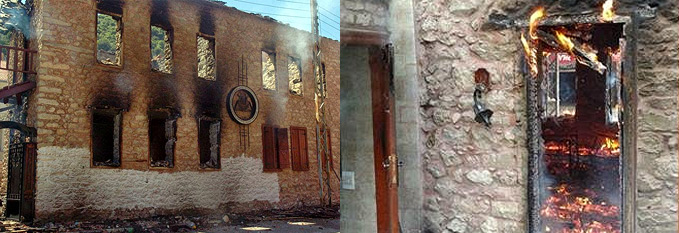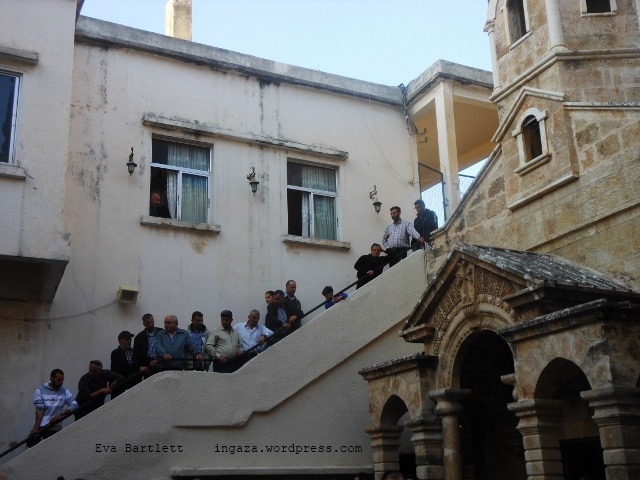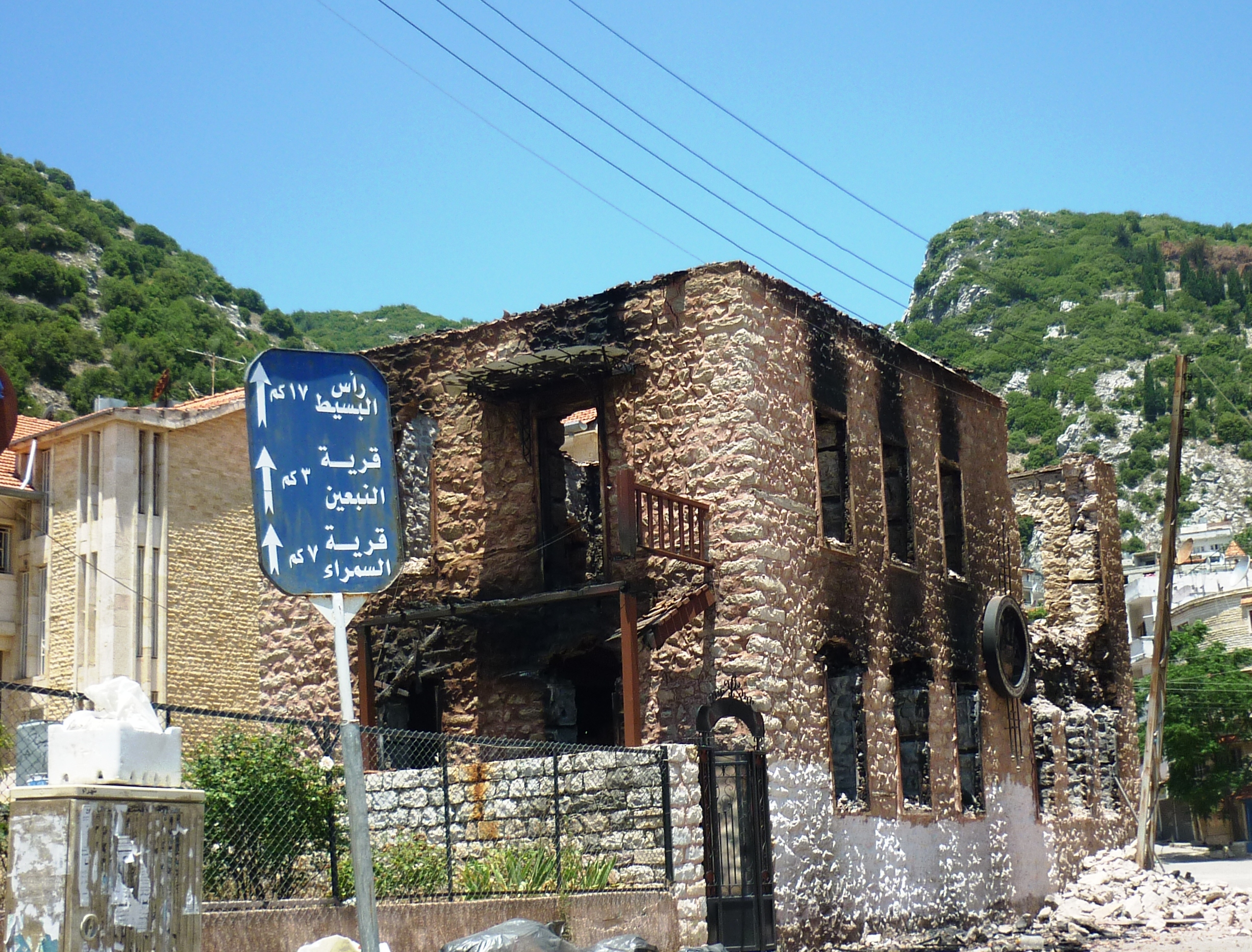“We were sleeping and at 4 a.m. they started striking us, from Turkey. At 6 a.m., men from our area came and took us to a village called Nab’ain, beyond the reach of the armed groups,” Suzy Mentazi, taking refuge in Latakia’s Armenian Orthodox Church, said in April, 2014.
Starting March 21, a reported 1,500 armed, largely foreign mercenaries, including Jabhat al-Nusra, crossed from Turkey to attack and take over Kassab, a predominantly-Armenian village north of Latakia and very close to Turkey. Rafi Der Jiboujian, another Kassab refugee in Latakia, said, “Turkey opened the border, and the armed groups came into Kassab, shooting and firing missiles at us. One missile from Turkey hit the local police station. We evacuated the area, because if we hadn’t left they would have butchered us, cut our heads off.”
As it was, “at least 80 people were massacred by the foreign insurgents, who from the beginning were sniping at and shelling mortars at the civilians of Kassab,” reported the Armenian-American news site Asbarez. “They slaughtered them, chopped them up, hung them. They slaughter in the name of Allah (God), they don’t have a God,” said Mentazi.
Lilly Martin, a Latakia resident who has a summer home in Kassab and knows many of the residents, reported a larger number killed, many brutally so. “They murdered 88 Armenians in Kassab, and beheaded 13 of them. Some residents were shot and killed immediately, without reason. One young man of 21 years of age was slaughtered in front of his father, just for the sheer fun of watching the father’s reaction. The father begged the terrorists to please allow him to quickly bury his son, before leaving Kassab. The killers refused.”
Martin also noted that some of the older civilians were not able to flee.
“There were a number of elderly residents who were unable to move quickly. The terrorists rounded up these 22 elderly folks, some men and some women, and incarcerated them in a cold room. They were mistreated for 12 days, in which they suffered greatly, all the while watching from the windows as Turkoman men in civilian clothes went house to house looting. They stole every refrigerator, stove, TV and washing machine. They stole video games, DVDs, CDs, dishes, pots and pans.”

The looting of every conceivable item or part for re-sale is consistent with the acts of “rebels” throughout Syria. In Homs, a resident showed video footage of his home stripped of valuables, machinery, and even electrical wiring and faucet taps.
An Al-Monitor report cites agreements between Turkey and Syria that “specified that Ankara should protect the common border between the two countries through the deployment of military forces.” Yet, according to reports and testimonies on the March take-over of Kassab, Turkey not only did not protect the border but actively participated in the attack, including downing a Syrian military plane in Syrian airspace, providing artillery cover for the insurgents, participating in the assault on the village, kidnapping Kassab residents, and ferrying wounded mercenaries to hospitals in Turkey.
Lilly Martin cites Syrian soldiers who fought to liberate Kassab. “In the very first hours of attack, it was done by the Turkish army alone. They used huge military canons. Turkish ambulances were photographed in Iskanderun with terrorists inside, and the Turkish people would open the doors and start hitting the terrorists…this was their form of protest, to show the world that the Turkish people do not support Erdogan’s attack on Kassab.”
Turkish journalist Cem Ertür’s detailed piece, “NATO and Turkey’s Genocidal War on Syria,” gives further insight into Turkey’s participation in the Kassab assault. “They were directly commanded by NATO’s radar base on Keldagi (Mount Aqraa) on the border and supported by the Turkish Armed Forces. The mercenaries used pick-up trucks fitted with anti-aircraft weapons, tanks belonging to the Turkish Armed Forces, vehicles loaded with heavy weaponry and lorries. The primary and initial assault was the one launched from the Yayladagi border gate to the opposite Kassab border gate, during which masked Turkish special forces troops killed 15 Syrian border guards.”
The report notes that Turkish Armed Forces were “giving cover to the mercenaries through mortar, artillery and rocket shelling across the border by armored vehicles and coordinated heavy machine-gun fire by helicopters,” as well as “intercepting the communication of the Syrian Army,” and attacking Syrian military bases near Kassab. The kidnapped Kassab residents were shipped off to Turkey, with Erdogan’s approval, Martin says.
“They were held against their will in a small village 23 kilometers north of Kassab named Vakifli, Turkey. They were held there almost 3 months and everyday they begged to be released. Finally, after almost 3 months of suffering they were allowed to leave Turkey and they were dropped off in Lebanon, then to face the grueling ordeal of making their way through Al Qaeda check points in Tripoli, Lebanon on the way to Latakia, Syria.”
NSNBC reported on April 5 that two of the abductees, both women in their 80s, said their kidnappers spoke in Turkish.
Cam Erimtan, in his “Searching for casus belli: Turkey’s assault on Kassab?” notes that “Turkey has been involved in the armed effort to unseat Bashar Assad since the very beginning, supplying, arming and supporting opposition forces overtly as well as covertly.”
Roughly 2,000 Kassab refugees sheltered in Latakia for nearly three months that the foreign mercenaries occupied the village. On June 15, the Syrian Army and the National Defense Forces liberated Kassab and the environs.
Reports from June 16 show residents returning to Kassab. Video footage shows a line of honking vehicles with residents waving Syrian flags, a circle of villagers dancing, and Syrian soldiers in place throughout the village. But aside from the celebrations, reports from Kassab show buildings still smoldering after being set ablaze as the militants retreated, churches vandalized, gutted and burned.
Martin reported the destruction she witnessed in the village.
“The destruction was tremendous,” she said. “The terrorists burnt houses, businesses and the churches as they left in defeat. When I got to Kassab the church was still smoldering. The exterior of the church was in good condition, proving that the damage was not from any battles, or missile, it was deliberately set on fire from inside by the terrorists.”

As with Homs, the mercenaries left homes booby-trapped with mines and other explosives, located and diffused by the Syrian army.
“The electricity department workers were everywhere, all along the road, they were on top of every pole, stringing new wires, They same crews were working as we drove back, they had been working all day in the sun trying to get the electricity back,” said Martin.
While in Kassab, she noted further evidence of Turkish involvement.
“I saw a Turkish ambulance inside Kassab. The soldiers said there were two of these Turkish ambulances in Kassab, for the purpose of transporting wounded terrorists to Turkey. [see again: NATO and Turkey’s Genocidal War on Syria]. One of the ambulances was in normal condition. The one I saw had been burnt from the inside, but the exterior was fine,” she noted, meaning it had not been a casualty of fighting.
Speaking with a Syrian soldier involved in the liberation of Kassab, Martin was told that, “When the Syrian soldiers burst into the rooms the terrorists had used, their plates of food were still warm and full. In other words, they had just sat down to eat an evening meal when the battle hit them. The soldier said the food had not been cooked in that room, but had been cooked in Turkey, just over the border, and then transported to the terrorists.”
While Kassab is now secured, families returning to re-build, areas like Raqqa still suffer from the presence of extremist groups imposing their distorted version of Islam, including floggings, chopping off hands, cutting off heads, and crucifixions.
On June 26, al-Nusra, an al-Qaeda affiliate and one of the main gangs involved in the take-over of Kassab, is reported to have pledged allegiance to the Takfiri extremist group Islamic State in Iraq and the Levant (ISIL).
“These radical Islamic terrorists are in fact anti-Islam, designed to humiliate Muslims globally,” says Martin. “They came from Afghanistan, and spoke no Arabic, they came from Britain and spoke only English, and their Australian cousins were along for the ride, as well as Moroccans, Tunisians and the Turkoman,” she said of those present in Kassab.
All images by Eva Bartlett



